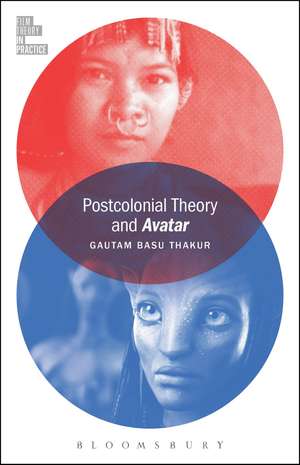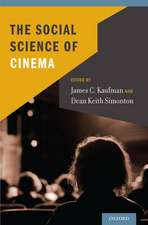Postcolonial Theory and Avatar: Film Theory in Practice
Autor Gautam Basu Thakuren Limba Engleză Paperback – 16 dec 2015
| Toate formatele și edițiile | Preț | Express |
|---|---|---|
| Paperback (1) | 150.96 lei 6-8 săpt. | |
| Bloomsbury Publishing – 16 dec 2015 | 150.96 lei 6-8 săpt. | |
| Hardback (1) | 494.10 lei 6-8 săpt. | |
| Bloomsbury Publishing – 16 dec 2015 | 494.10 lei 6-8 săpt. |
Preț: 150.96 lei
Preț vechi: 186.50 lei
-19% Nou
Puncte Express: 226
Preț estimativ în valută:
28.89€ • 30.24$ • 23.90£
28.89€ • 30.24$ • 23.90£
Carte tipărită la comandă
Livrare economică 07-21 aprilie
Preluare comenzi: 021 569.72.76
Specificații
ISBN-13: 9781628925630
ISBN-10: 1628925639
Pagini: 208
Dimensiuni: 127 x 197 x 15 mm
Greutate: 0.23 kg
Editura: Bloomsbury Publishing
Colecția Bloomsbury Academic
Seria Film Theory in Practice
Locul publicării:New York, United States
ISBN-10: 1628925639
Pagini: 208
Dimensiuni: 127 x 197 x 15 mm
Greutate: 0.23 kg
Editura: Bloomsbury Publishing
Colecția Bloomsbury Academic
Seria Film Theory in Practice
Locul publicării:New York, United States
Caracteristici
Demonstration of the theory as a practical framework for understanding the meaningful structure of a film
Notă biografică
Gautam Basu Thakur is Assistant Professor of English at Boise State University, USA. His teaching and research interests include postcolonial literature and theory, transnational/world literature, critical theory with a particular focus on Freudian-Lacanian psychoanalysis, and nineteenth- and twentieth-century British literature of the Empire.
Cuprins
Introduction Section 1: The Postcolonial Avatar: A Brief History of Postcolonial Theory Section 2: Postcolonial Theory and Avatar, Or, Postcolonial Criticism in a Multicultural World ConclusionAppendices- Further Reading- Filmography
Recenzii
Adopting a fresh perspective as well as inviting a sharp critical stance, the book is a pleasurable and excellent read.
What makes this book particularly compelling is the author's strong voice. Basu Thakur dismantles and revamps postcolonial scholarship with firm conviction, and his film analysis is driven by a desire to uncover what he sees as the truth behind Avatar's beguiling surface.
This erudite and brilliantly provocative book takes us on a familiar journey through the history of post-colonial theory in order to end up in a new place: a critique not of colonialism but instead of the new Eurocentric neo-liberal, globalized subject. Basu Thakur teases us by juxtaposing James Cameron's Avatar with Michael Haneke's Caché. Of these two, it is Caché that surprisingly ends up with the post-colonial laurels for expressing what it is to be 'truly imagined by other worlds,' whereas Avatar is dismissed for re-presenting the fantasy of otherness that supplements the West's on-going performance of its own politically correct, neo-liberal subjectivity. This book will outrage even as it informs, adding new fire to the criticism of what Basu Thakur calls 'the West's unending imaginative vacuity about otherness.'
Straightforwardly written, yet sufficiently critical, Basu Thakur stakes a claim for the resurrection of postcolonial theory as a critical praxis, one that can help us examine the veiled strategies of othering that lay not so much at the margins, but at the very heart of our global Western imagination.
Cogent and lucid, this book is an original contribution to postcolonial theory, and the reading of Avatar follows unexpected avenues toward a new understanding of one of the most popular films of recent decades.
What makes this book particularly compelling is the author's strong voice. Basu Thakur dismantles and revamps postcolonial scholarship with firm conviction, and his film analysis is driven by a desire to uncover what he sees as the truth behind Avatar's beguiling surface.
This erudite and brilliantly provocative book takes us on a familiar journey through the history of post-colonial theory in order to end up in a new place: a critique not of colonialism but instead of the new Eurocentric neo-liberal, globalized subject. Basu Thakur teases us by juxtaposing James Cameron's Avatar with Michael Haneke's Caché. Of these two, it is Caché that surprisingly ends up with the post-colonial laurels for expressing what it is to be 'truly imagined by other worlds,' whereas Avatar is dismissed for re-presenting the fantasy of otherness that supplements the West's on-going performance of its own politically correct, neo-liberal subjectivity. This book will outrage even as it informs, adding new fire to the criticism of what Basu Thakur calls 'the West's unending imaginative vacuity about otherness.'
Straightforwardly written, yet sufficiently critical, Basu Thakur stakes a claim for the resurrection of postcolonial theory as a critical praxis, one that can help us examine the veiled strategies of othering that lay not so much at the margins, but at the very heart of our global Western imagination.
Cogent and lucid, this book is an original contribution to postcolonial theory, and the reading of Avatar follows unexpected avenues toward a new understanding of one of the most popular films of recent decades.


























